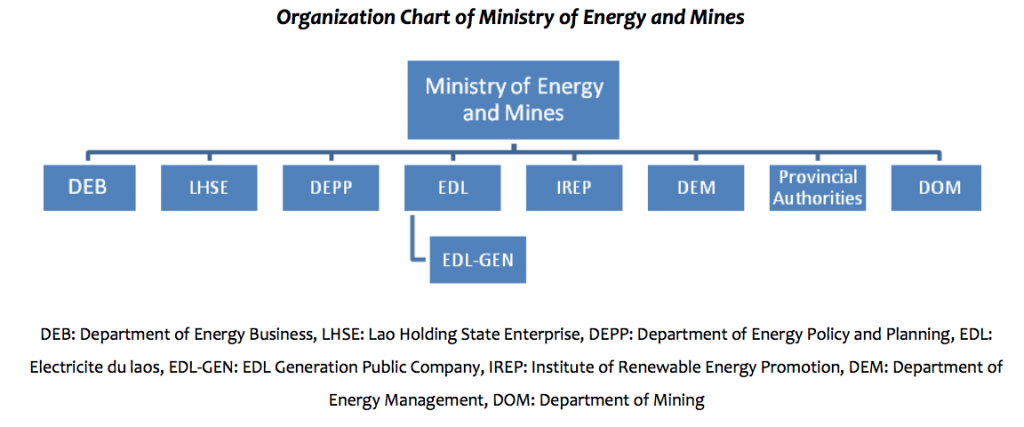The main laws and policies that govern the electricity supply in Lao PDR are:
- The Electricity Law 1997, amended in 2012. This governs electricity generation and distribution in Lao PDR. It sets standards for the administration, production, distribution, transmission and imports/exports of electricity.1
- The Power Sector Policy Statement 2001 aims to provide affordable electricity to all. This goal includes objectives to increase the electrification rate to 90 percent by 2020, promote public-private partnerships in hydropower development and implement a 500-kilovolt grid development.2
- The 8th National Socio-Economic Development Plan (NSEDP) 2016–20 identifies the direction required for the energy sector: “Focus on hydropower development, thermal electric power, solar energy and industrial plants energy in order to turn the power sector into a sustainable income-generating sector to support various productions and to solve the people’s poverty.”3
- The Renewable Energy Development Strategy acknowledges the importance of renewable energy sources and their development. It sets a goal of increasing the share of renewable energy to 30 percent and replacing 10 percent of transport fuels with biofuels by 2025.4
- The Policy on Sustainable Hydropower development in Lao PDR targets hydropower projects that are larger than 15 MW generation capacity. It provides policy guidance to agencies that manage hydropower investment projects and raises awareness.5
- The Power Development Plan is prepared by Electricite Du Laos every three to five years. The plan reviews the most recent electricity demand forecast and prospective project developments.6
Legal and administrative framework
The roles of the main actors in the power sector are:
- The Ministry of Energy and Mines (MEM), which oversees the management of all energy-related activities in Lao PDR. The MEM is responsible for developing policies and strategies, supervising electricity company businesses and implementing laws and regulations. It works closely with Electricite du Laos, Lao Holding State Enterprise, the Ministry of Finance and the Ministry of Natural Resources and the Environment.
- The Department of Energy Business (DEB) is responsible for private sector investments in the power sector. Additionally, it is involved in negotiating project development agreements, concession agreements and power purchase agreements.
- The Department of Energy Policy and Planning (DEPP) is responsible for energy policy-making and planning.
- The Department of Energy Management (DEM) is responsible for drafting energy laws, guidelines, safety standards and regulations. DEM also acts as a monitoring body over government agencies, private entities, and state-owned enterprises to ensure they are following all rules and regulations.
- The Institute of Renewable Energy Promotion (IREP) promotes renewable energy and conservation. It does this through developing projects focused on renewable energy sources and creating a manual on renewable energy production and use.
- Electricite du Laos (EdL) is a state-owned electric power utility that manages the country’s electricity generation, transmission and distribution. The corporation also manages imports and exports of electricity. In 2010, the Lao government transferred the responsibility for electricity generation to EdL-Gen Company.
- The EdL-Gen Public Company (EdL-Gen) was established in 2010 to generate energy for EdL, set up joint ventures with other electricity generation projects and provide management for other projects.
- The Lao Holding State Enterprise (LHSE) is a state corporation that holds and manages shares of IPP projects.

Energy Administration. Source: UNESCAP 2014. “Lao PDR National Sustainable Energy Strategy on Enabling Environment and Technology Innovation Ecosystem for Affordable Sustainable Energy Options”. Accessed 8 June 2018.
References
- 1. National Assembly. 2011. “Law on Electricity.” Accessed 6 June 2018.
- 2. Asian Development Bank. 2010. “Energy Sector in the Lao People’s Democratic Republic.” Accessed 7 June 2018.
- 3. Ministry of Planning and Investment. 2016. “8th National Socio-Economic Development Plan (NSEDP) 2016–20.” Accessed 7 June 2018.
- 4. Lao Institute for Renewable Energy. 2011. “Renewable Energy Development Strategy in Lao PDR.” Accessed 8 June 2018.
- 5. Government of Lao PDR. 2015. “National Policy on Sustainable Hydropower Development in Lao PDR.” Accessed 8 June 2018.
- 6. UNESCAP. 2014. “Lao PDR National Sustainable Energy Strategy on Enabling Environment and Technology Innovation Ecosystem for Affordable Sustainable Energy Options.” Accessed 8 June 2018.

